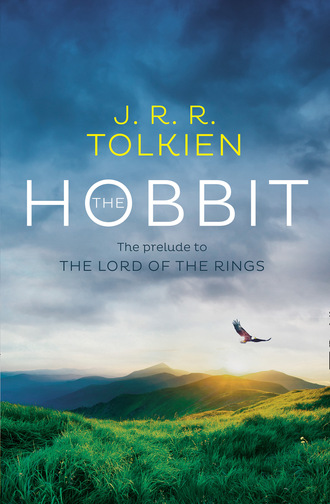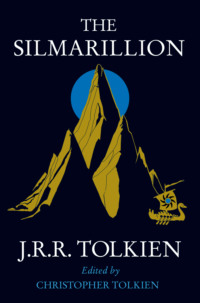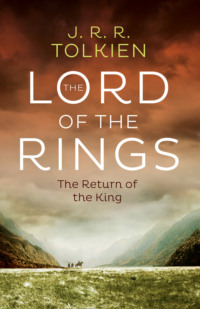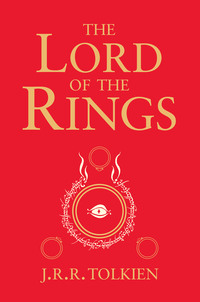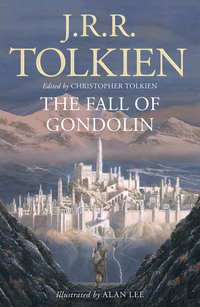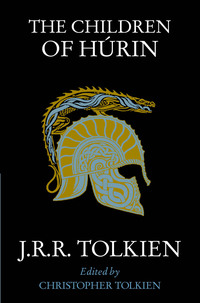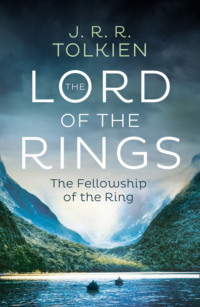“Throng!” thought Mr. Baggins. “I don’t like the sound of that. I really must sit down for a minute and collect my wits, and have a drink.” He had only just had a sip—in the corner, while the four dwarves sat round the table, and talked about mines and gold and troubles with the goblins, and the depredations of dragons, and lots of other things which he did not understand, and did not want to, for they sounded much too adventurous—when, ding-dong-a-ling-dang, his bell rang again, as if some naughty little hobbit-boy was trying to pull the handle off.
“Someone at the door!” he said, blinking.
“Some four, I should say by the sound,” said Fili. “Besides, we saw them coming along behind us in the distance.”
The poor little hobbit sat down in the hall and put his head in his hands, and wondered what had happened, and what was going to happen, and whether they would all stay to supper. Then the bell rang again louder than ever, and he had to run to the door. It was not four after all, it was five. Another dwarf had come along while he was wondering in the hall. He had hardly turned the knob, before they were all inside, bowing and saying “at your service” one after another. Dori, Nori, Ori, Oin, and Gloin were their names; and very soon two purple hoods, a grey hood, a brown hood, and a white hood were hanging on the pegs, and off they marched with their broad hands stuck in their gold and silver belts to join the others. Already it had almost become a throng. Some called for ale, and some for porter, and one for coffee, and all of them for cakes; so the hobbit was kept very busy for a while.
A big jug of coffee had just been set in the hearth, the seed-cakes were gone, and the dwarves were starting on a round of buttered scones, when there came—a loud knock. Not a ring, but a hard rat-tat on the hobbit’s beautiful green door. Somebody was banging with a stick!
Bilbo rushed along the passage, very angry, and altogether bewildered and bewuthered—this was the most awkward Wednesday he ever remembered. He pulled open the door with a jerk, and they all fell in, one on top of the other. More dwarves, four more! And there was Gandalf behind, leaning on his staff and laughing. He had made quite a dent on the beautiful door; he had also, by the way, knocked out the secret mark that he had put there the morning before.
“Carefully! Carefully!” he said. “It is not like you, Bilbo, to keep friends waiting on the mat, and then open the door like a pop-gun! Let me introduce Bifur, Bofur, Bombur, and especially Thorin!”
“At your service!” said Bifur, Bofur, and Bombur standing in a row. Then they hung up two yellow hoods and a pale green one; and also a sky-blue one with a long silver tassel. This last belonged to Thorin, an enormously important dwarf, in fact no other than the great Thorin Oakenshield himself, who was not at all pleased at falling flat on Bilbo’s mat with Bifur, Bofur, and Bombur on top of him. For one thing Bombur was immensely fat and heavy. Thorin indeed was very haughty, and said nothing about service; but poor Mr. Baggins said he was sorry so many times, that at last he grunted “pray don’t mention it,” and stopped frowning.
“Now we are all here!” said Gandalf, looking at the row of thirteen hoods—the best detachable party hoods—and his own hat hanging on the pegs. “Quite a merry gathering! I hope there is something left for the late-comers to eat and drink! What’s that? Tea! No thank you! A little red wine, I think for me.”
“And for me,” said Thorin.
“And raspberry jam and apple-tart,” said Bifur.
“And mince-pies and cheese,” said Bofur.
“And pork-pie and salad,” said Bombur.
“And more cakes—and ale—and coffee, if you don’t mind,” called the other dwarves through the door.
“Put on a few eggs, there’s a good fellow!” Gandalf called after him, as the hobbit stumped off to the pantries. “And just bring out the cold chicken and pickles!”
“Seems to know as much about the inside of my larders as I do myself!” thought Mr. Baggins, who was feeling positively flummoxed, and was beginning to wonder whether a most wretched adventure had not come right into his house. By the time he had got all the bottles and dishes and knives and forks and glasses and plates and spoons and things piled up on big trays, he was getting very hot, and red in the face, and annoyed.
“Confusticate and bebother these dwarves!” he said aloud. “Why don’t they come and lend a hand?” Lo and behold! there stood Balin and Dwalin at the door of the kitchen, and Fili and Kili behind them, and before he could say knife they had whisked the trays and a couple of small tables into the parlour and set out everything afresh.
Gandalf sat at the head of the party with the thirteen dwarves all round: and Bilbo sat on a stool at the fireside, nibbling at a biscuit (his appetite was quite taken away), and trying to look as if this was all perfectly ordinary and not in the least an adventure. The dwarves ate and ate, and talked and talked, and time got on. At last they pushed their chairs back, and Bilbo made a move to collect the plates and glasses.
“I suppose you will all stay to supper?” he said in his politest unpressing tones.
“Of course!” said Thorin. “And after. We shan’t get through the business till late, and we must have some music first. Now to clear up!”
Thereupon the twelve dwarves—not Thorin, he was too important, and stayed talking to Gandalf—jumped to their feet, and made tall piles of all the things. Off they went, not waiting for trays, balancing columns of plates, each with a bottle on the top, with one hand, while the hobbit ran after them almost squeaking with fright: “please be careful!” and “please, don’t trouble! I can manage.” But the dwarves only started to sing:
Chip the glasses and crack the plates!
Blunt the knives and bend the forks!
That’s what Bilbo Baggins hates–
Smash the bottles and burn the corks!
Cut the cloth and tread on the fat!
Pour the milk on the pantry floor!
Leave the bones on the bedroom mat!
Splash the wine on every door!
Dump the crocks in a boiling bowl;
Pound them up with a thumping pole;
And when you’ve finished, if any are whole,
Send them down the hall to roll!
That’s what Bilbo Baggins hates!
So, carefully! carefully with the plates!
And of course they did none of these dreadful things, and everything was cleaned and put away safe as quick as lightning, while the hobbit was turning round and round in the middle of the kitchen trying to see what they were doing. Then they went back, and found Thorin with his feet on the fender smoking a pipe. He was blowing the most enormous smoke-rings, and wherever he told one to go, it went—up the chimney, or behind the clock on the mantelpiece, or under the table, or round and round the ceiling; but wherever it went it was not quick enough to escape Gandalf. Pop! he sent a smaller smoke-ring from his short clay-pipe straight through each one of Thorin’s. Then Gandalf’s smoke-ring would go green and come back to hover over the wizard’s head. He had a cloud of them about him already, and in the dim light it made him look strange and sorcerous. Bilbo stood still and watched—he loved smoke-rings—and then he blushed to think how proud he had been yesterday morning of the smoke-rings he had sent up the wind over The Hill.
“Now for some music!” said Thorin. “Bring out the instruments!”
Kili and Fili rushed for their bags and brought back little fiddles; Dori, Nori, and Ori brought out flutes from somewhere inside their coats; Bombur produced a drum from the hall; Bifur and Bofur went out too, and came back with clarinets that they had left among the walking-sticks. Dwalin and Balin said: “Excuse me, I left mine in the porch!” “Just bring mine in with you!” said Thorin. They came back with viols as big as themselves, and with Thorin’s harp wrapped in a green cloth. It was a beautiful golden harp, and when Thorin struck it the music began all at once, so sudden and sweet that Bilbo forgot everything else, and was swept away into dark lands under strange moons, far over The Water and very far from his hobbit-hole under The Hill.
The dark came into the room from the little window that opened in the side of The Hill; the firelight flickered—it was April—and still they played on, while the shadow of Gandalf’s beard wagged against the wall.
The dark filled all the room, and the fire died down, and the shadows were lost, and still they played on. And suddenly first one and then another began to sing as they played, deep-throated singing of the dwarves in the deep places of their ancient homes; and this is like a fragment of their song, if it can be like their song without their music.
Far over the misty mountains cold
To dungeons deep and caverns old
We must away ere break of day
To seek the pale enchanted gold.
The dwarves of yore made mighty spells,
While hammers fell like ringing bells
In places deep, where dark things sleep,
In hollow halls beneath the fells.
For ancient king and elvish lord
There many a gleaming golden hoard
They shaped and wrought, and light they caught
To hide in gems on hilt of sword.
On silver necklaces they strung
The flowering stars, on crowns they hung
The dragon-fire, in twisted wire
They meshed the light of moon and sun.
Far over the misty mountains cold
To dungeons deep and caverns old
We must away, ere break of day,
To claim our long-forgotten gold.
Goblets they carved there for themselves
And harps of gold; where no man delves
There lay they long, and many a song
Was sung unheard by men or elves.
The pines were roaring on the height,
The winds were moaning in the night.
The fire was red, it flaming spread;
The trees like torches blazed with light.
The bells were ringing in the dale
And men looked up with faces pale;
The dragon’s ire more fierce than fire
Laid low their towers and houses frail.
The mountain smoked beneath the moon;
The dwarves, they heard the tramp of doom.
They fled their hall to dying fall
Beneath his feet, beneath the moon.
Far over the misty mountains grim
To dungeons deep and caverns dim
We must away, ere break of day,
To win our harps and gold from him!
As they sang the hobbit felt the love of beautiful things made by hands and by cunning and by magic moving through him, a fierce and a jealous love, the desire of the hearts of dwarves. Then something Tookish woke up inside him, and he wished to go and see the great mountains, and hear the pine-trees and the waterfalls, and explore the caves, and wear a sword instead of a walking-stick. He looked out of the window. The stars were out in a dark sky above the trees. He thought of the jewels of the dwarves shining in dark caverns. Suddenly in the wood beyond The Water a flame leapt up—probably somebody lighting a wood-fire—and he thought of plundering dragons settling on his quiet Hill and kindling it all to flames. He shuddered; and very quickly he was plain Mr. Baggins of Bag-End, Under-Hill, again.
He got up trembling. He had less than half a mind to fetch the lamp, and more than half a mind to pretend to, and go and hide behind the beer-barrels in the cellar, and not come out again until all the dwarves had gone away. Suddenly he found that the music and the singing had stopped, and they were all looking at him with eyes shining in the dark.
“Where are you going?” said Thorin, in a tone that seemed to show that he guessed both halves of the hobbit’s mind.
“What about a little light?” said Bilbo apologetically.
“We like the dark,” said all the dwarves. “Dark for dark business! There are many hours before dawn.”
“Of course!” said Bilbo, and sat down in a hurry. He missed the stool and sat in the fender, knocking over the poker and shovel with a crash.
“Hush!” said Gandalf. “Let Thorin speak!” And this is how Thorin began.
“Gandalf, dwarves and Mr. Baggins! We are met together in the house of our friend and fellow conspirator, this most excellent and audacious hobbit—may the hair on his toes never fall out! all praise to his wine and ale!—” He paused for breath and for a polite remark from the hobbit, but the compliments were quite lost on poor Bilbo Baggins, who was wagging his mouth in protest at being called audacious and worst of all fellow conspirator, though no noise came out, he was so flummoxed. So Thorin went on:
“We are met to discuss our plans, our ways, means, policy and devices. We shall soon before the break of day start on our long journey, a journey from which some of us, or perhaps all of us (except our friend and counsellor, the ingenious wizard Gandalf) may never return. It is a solemn moment. Our object is, I take it, well known to us all. To the estimable Mr. Baggins, and perhaps to one or two of the younger dwarves (I think I should be right in naming Kili and Fili, for instance), the exact situation at the moment may require a little brief explanation—”
This was Thorin’s style. He was an important dwarf. If he had been allowed, he would probably have gone on like this until he was out of breath, without telling any one there anything that was not known already. But he was rudely interrupted. Poor Bilbo couldn’t bear it any longer. At may never return he began to feel a shriek coming up inside, and very soon it burst out like the whistle of an engine coming out of a tunnel. All the dwarves sprang up, knocking over the table. Gandalf struck a blue light on the end of his magic staff, and in its firework glare the poor little hobbit could be seen kneeling on the hearth-rug, shaking like a jelly that was melting. Then he fell flat on the floor, and kept on calling out “struck by lightning, struck by lightning!” over and over again; and that was all they could get out of him for a long time. So they took him and laid him out of the way on the drawing-room sofa with a drink at his elbow, and they went back to their dark business.
“Excitable little fellow,” said Gandalf, as they sat down again. “Gets funny queer fits, but he is one of the best, one of the best—as fierce as a dragon in a pinch.”
If you have ever seen a dragon in a pinch, you will realize that this was only poetical exaggeration applied to any hobbit, even to Old Took’s great-grand-uncle Bullroarer, who was so huge (for a hobbit) that he could ride a horse. He charged the ranks of the goblins of Mount Gram in the Battle of the Green Fields, and knocked their king Golfimbul’s head clean off with a wooden club. It sailed a hundred yards through the air and went down a rabbit-hole, and in this way the battle was won and the game of Golf invented at the same moment.
In the meanwhile, however, Bullroarer’s gentler descendant was reviving in the drawing-room. After a while and a drink he crept nervously to the door of the parlour. This is what he heard, Gloin speaking: “Humph!” (or some snort more or less like that). “Will he do, do you think? It is all very well for Gandalf to talk about this hobbit being fierce, but one shriek like that in a moment of excitement would be enough to wake the dragon and all his relatives, and kill the lot of us. I think it sounded more like fright than excitement! In fact, if it had not been for the sign on the door, I should have been sure we had come to the wrong house. As soon as I clapped eyes on the little fellow bobbing and puffing on the mat, I had my doubts. He looks more like a grocer than a burglar!”
Then Mr. Baggins turned the handle and went in. The Took side had won. He suddenly felt he would go without bed and breakfast to be thought fierce. As for little fellow bobbing on the mat it almost made him really fierce. Many a time afterwards the Baggins part regretted what he did now, and he said to himself: “Bilbo, you were a fool; you walked right in and put your foot in it.”
“Pardon me,” he said, “if I have overheard words that you were saying. I don’t pretend to understand what you are talking about, or your reference to burglars, but I think I am right in believing” (this is what he called being on his dignity) “that you think I am no good. I will show you. I have no signs on my door—it was painted a week ago—, and I am quite sure you have come to the wrong house. As soon as I saw your funny faces on the door-step, I had my doubts. But treat it as the right one. Tell me what you want done, and I will try it, if I have to walk from here to the East of East and fight the wild Were-worms in the Last Desert. I had a great-great-great-grand-uncle once, Bullroarer Took, and—”
“Yes, yes, but that was long ago,” said Gloin. “I was talking about you. And I assure you there is a mark on this door—the usual one in the trade, or used to be. Burglar wants a good job, plenty of Excitement and reasonable Reward, that’s how it is usually read. You can say Expert Treasure-hunter instead of Burglar if you like. Some of them do. It’s all the same to us. Gandalf told us that there was a man of the sort in these parts looking for a Job at once, and that he had arranged for a meeting here this Wednesday tea-time.”
“Of course there is a mark,” said Gandalf. “I put it there myself. For very good reasons. You asked me to find the fourteenth man for your expedition, and I chose Mr. Baggins. Just let any one say I chose the wrong man or the wrong house, and you can stop at thirteen and have all the bad luck you like, or go back to digging coal.”
He scowled so angrily at Gloin that the dwarf huddled back in his chair; and when Bilbo tried to open his mouth to ask a question, he turned and frowned at him and stuck out his bushy eyebrows, till Bilbo shut his mouth tight with a snap. “That’s right,” said Gandalf. “Let’s have no more argument. I have chosen Mr. Baggins and that ought to be enough for all of you. If I say he is a Burglar, a Burglar he is, or will be when the time comes. There is a lot more in him than you guess, and a deal more than he has any idea of himself. You may (possibly) all live to thank me yet. Now Bilbo, my boy, fetch the lamp, and let’s have a little light on this!”
On the table in the light of a big lamp with a red shade he spread a piece of parchment rather like a map.
“This was made by Thror, your grandfather, Thorin,” he said in answer to the dwarves’ excited questions. “It is a plan of the Mountain.”
“I don’t see that this will help us much,” said Thorin disappointedly after a glance. “I remember the Mountain well enough and the lands about it. And I know where Mirkwood is, and the Withered Heath where the great dragons bred.”
“There is a dragon marked in red on the Mountain,” said Balin, “but it will be easy enough to find him without that, if ever we arrive there.”
“There is one point that you haven’t noticed,” said the wizard, “and that is the secret entrance. You see that rune on the West side, and the hand pointing to it from the other runes? That marks a hidden passage to the Lower Halls.” (Look at the map at the beginning of this book, and you will see there the runes.)
“It may have been secret once,” said Thorin, “but how do we know that it is secret any longer? Old Smaug has lived there long enough now to find out anything there is to know about those caves.”
“He may—but he can’t have used it for years and years.”
“Why?”
“Because it is too small. ‘Five feet high the door and three may walk abreast’ say the runes, but Smaug could not creep into a hole that size, not even when he was a young dragon, certainly not after devouring so many of the dwarves and men of Dale.”
“It seems a great big hole to me,” squeaked Bilbo (who had no experience of dragons and only of hobbit-holes). He was getting excited and interested again, so that he forgot to keep his mouth shut. He loved maps, and in his hall there hung a large one of the Country Round with all his favourite walks marked on it in red ink. “How could such a large door be kept secret from everybody outside, apart from the dragon?” he asked. He was only a little hobbit you must remember.
“In lots of ways,” said Gandalf. “But in what way this one has been hidden we don’t know without going to see. From what it says on the map I should guess there is a closed door which has been made to look exactly like the side of the Mountain. That is the usual dwarves’ method—I think that is right, isn’t it?”
“Quite right,” said Thorin.
“Also,” went on Gandalf, “I forgot to mention that with the map went a key, a small and curious key. Here it is!” he said, and handed to Thorin a key with a long barrel and intricate wards, made of silver. “Keep it safe!”
“Indeed I will,” said Thorin, and he fastened it upon a fine chain that hung about his neck and under his jacket. “Now things begin to look more hopeful. This news alters them much for the better. So far we have had no clear idea what to do. We thought of going East, as quiet and careful as we could, as far as the Long Lake. After that the trouble would begin—.”
“A long time before that, if I know anything about the roads East,” interrupted Gandalf.
“We might go from there up along the River Running,” went on Thorin taking no notice, “and so to the ruins of Dale—the old town in the valley there, under the shadow of the Mountain. But we none of us liked the idea of the Front Gate. The river runs right out of it through the great cliff at the South of the Mountain, and out of it comes the dragon too—far too often, unless he has changed his habits.”
“That would be no good,” said the wizard, “not without a mighty Warrior, even a Hero. I tried to find one; but warriors are busy fighting one another in distant lands, and in this neighbourhood heroes are scarce, or simply not to be found. Swords in these parts are mostly blunt, and axes are used for trees, and shields as cradles or dish-covers; and dragons are comfortably far-off (and therefore legendary). That is why I settled on burglary—especially when I remembered the existence of a Side-door. And here is our little Bilbo Baggins, the burglar, the chosen and selected burglar. So now let’s get on and make some plans.”
“Very well then,” said Thorin, “supposing the burglar-expert gives us some ideas or suggestions.” He turned with mock-politeness to Bilbo.
“First I should like to know a bit more about things,” said he, feeling all confused and a bit shaky inside, but so far still Tookishly determined to go on with things. “I mean about the gold and the dragon, and all that, and how it got there, and who it belongs to, and so on and further.”
“Bless me!” said Thorin, “haven’t you got a map? and didn’t you hear our song? and haven’t we been talking about all this for hours?”
“All the same, I should like it all plain and clear,” said he obstinately, putting on his business manner (usually reserved for people who tried to borrow money off him), and doing his best to appear wise and prudent and professional and live up to Gandalf’s recommendation. “Also I should like to know about risks, out-of-pocket expenses, time required and remuneration, and so forth”—by which he meant: “What am I going to get out of it? and am I going to come back alive?”


